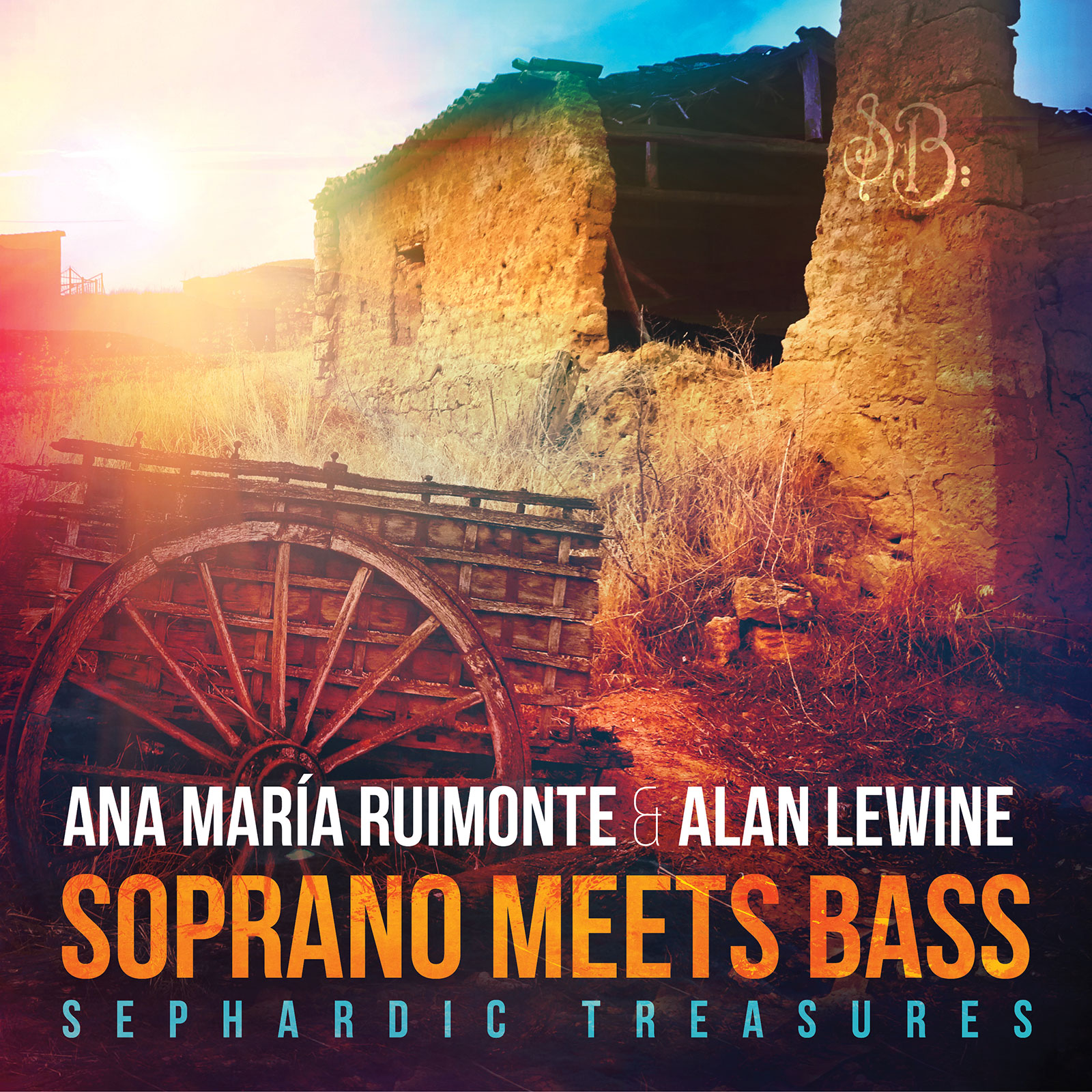
Share Album:
Soprano Meets Bass – Sephardic Treasures
Alan Lewine composer, bass
Ana María Ruimonte soprano
SOPRANO MEETS BASS is the latest from Ansonica Records. This album of traditional medieval Sephardic songs arranged by jazz bassist and music director Alan Lewine and classical soprano Ana María Ruimonte is an ethnomusicological celebration of the ancient Sephardic culture. These Spanish Jews were expelled from Spain in the 15th Century and resettled throughout the world, mingling their musical traditions with those of other peoples they encountered. The original arrangements meld medieval Moorish Iberia, jazz, flamenco, Middle Eastern music, and bel canto. They have set these songs in a sort of recombinant world fusion reflecting a vibrant embodiment of the Sephardic communities and their culture.
As the album’s title suggests, the female voice plays a starring role in SOPRANO MEETS BASS. This reflects the fact that the Sephardic tradition has, for centuries, been an oral one, passed down from mother to daughter across an expanse of generations. Only in the 20th Century were these songs transcribed by musicologists. The stories told in the Sephardic Romancero—the repertoire from which the album’s program is drawn—conjure up portraits of life in medieval Spain and the universal truths that undergird them. Spanish soprano Ana María Ruimonte gives life to these ancient melodies and lyrics, radiating from the center of a constellation of renowned virtuosos. Flamenco guitar, Israeli flute, shofar, and a trove of other culturally significant musical instruments vitalize the music of SOPRANO MEETS BASS. And, thanks to the modern, high-fidelity recording quality of these performances, the listener is immersed in the tradition like never before.
The artists’ arrangements of the songs on SOPRANO MEETS BASS have been performed throughout the world, from Spain to Cuba to Israel and the United States. This is fitting, since each of these nations has had a hand in forming the unique amalgam of cultural music we hear in this album. In fact, given the vast swath of history and human experience inherent in the arrangements of Lewine and Ruimonte, listeners of all backgrounds are bound to find something of themselves in the rhythms and timbres of SOPRANO MEETS BASS.
Listen
Stream/Buy
Choose your platform
Track Listing & Credits
| # | Title | Composer | Performer | |
|---|---|---|---|---|
| 01 | Las Cumadres Fechiceras | Traditional, arr. Alan Lewine & Ana María Ruimonte | Alan Lewine, bass; Ana María Ruimonte, vocals, castanets; Hadar Noiberg, flute; Duane Eubanks, trumpet; Julián Vaquero, flamenco guitar, palmas; Víctor Monge, cajón flamenco, percussion, palmas; Shai Wetzer, drums, percussion, palmas | 5:36 |
| 02 | La Infanticida | Traditional, arr. Alan Lewine & Ana María Ruimonte | Alan Lewine, bass; Ana María Ruimonte, vocals, castanets; Alicia Svigals, violin; Julián Vaquero, flamenco guitar, palmas; Shai Wetzer, drums, percussion, palmas | 3:40 |
| 03 | El Rey Cuando Amadrugaba | Traditional, arr. Alan Lewine & Ana María Ruimonte | Alan Lewine, bass; Ana María Ruimonte, vocals, castanets; Hadar Noiberg, flute; Julián Vaquero, flamenco guitar, palmas; Víctor Monge, cajón flamenco, percussion, palmas; Shai Wetzer, drums, percussion, palmas; Yonnie Dror, shofar | 3:33 |
| 04 | Al Pasar por Casablanca | Traditional, arr. Alan Lewine & Ana María Ruimonte | Alan Lewine, bass; Ana María Ruimonte, vocals, castanets; Hadar Noiberg, flute; Julián Vaquero, flamenco guitar, palmas; Víctor Monge, cajón flamenco, percussion, palmas; Shai Wetzer, drums, percussion, palmas | 4:39 |
| 05 | En Casa del Rey León | Traditional, arr. Alan Lewine & Ana María Ruimonte | Alan Lewine, bass; Ana María Ruimonte, vocals, castanets; Chano Domínguez, piano; Víctor Monge, cajón flamenco, percussion, palmas; Shai Wetzer, drums, percussion, palmas | 4:34 |
| 06 | Triste Está el Rey David | Traditional, arr. Alan Lewine & Ana María Ruimonte | Alan Lewine, bass; Ana María Ruimonte, vocals, castanets; Duane Eubanks, trumpet; Julián Vaquero, flamenco guitar, palmas; Víctor Monge, cajón flamenco, percussion, palmas; Shai Wetzer, drums, percussion, palmas | 4:45 |
| 07 | Maldiciendo el Rey | Traditional, arr. Alan Lewine & Ana María Ruimonte | Alan Lewine, bass; Ana María Ruimonte, vocals, castanets; Julián Vaquero, flamenco guitar, palmas; Víctor Monge, cajón flamenco, percussion, palmas; Shai Wetzer, drums, percussion, palmas | 3:58 |
| 08 | Tristes Nuevas | Traditional, arr. Alan Lewine & Ana María Ruimonte | Alan Lewine, bass; Ana María Ruimonte, vocals, castanets; Duane Eubanks, trumpet; Julián Vaquero, flamenco guitar, palmas; Shai Wetzer, drums, percussion, palmas | 4:30 |
| 09 | Días de la Semana | Traditional, arr. Alan Lewine & Ana María Ruimonte | Alan Lewine, bass; Ana María Ruimonte, vocals, castanets; Julián Vaquero, flamenco guitar, palmas; Víctor Monge, cajón flamenco, percussion, palmas | 3:09 |
| 10 | Cantiga de Cuna | Traditional, arr. Alan Lewine & Ana María Ruimonte | Alan Lewine, bass; Ana María Ruimonte, vocals, castanets; Hadar Noiberg, flute; Julián Vaquero, flamenco guitar, palmas; Víctor Monge, cajón flamenco, percussion, palmas; Shai Wetzer, drums, percussion, palmas | 2:56 |
| 11 | Señor don Gato | Traditional, arr. Alan Lewine & Ana María Ruimonte | Alan Lewine, bass; Ana María Ruimonte, vocals, castanets; Alicia Svigals, violin; Julián Vaquero, flamenco guitar, palmas; Shai Wetzer, drums, percussion, palmas | 2:02 |
| 12 | Vido Venir Tres a Caballo | Traditional, arr. Alan Lewine & Ana María Ruimonte | Alan Lewine, bass; Ana María Ruimonte, vocals, castanets; Julián Vaquero, flamenco guitar, palmas; Víctor Monge, cajón flamenco, percussion, palmas; Shai Wetzer, drums, percussion, palmas | 6:05 |
| 13 | Tres Morillas de Jaén | Traditional, arr. Alan Lewine & Ana María Ruimonte | Alan Lewine, bass; Ana María Ruimonte, vocals, castanets; Julián Vaquero, flamenco guitar, palmas; Víctor Monge, cajón flamenco, percussion, palmas; Shai Wetzer, drums, percussion, palmas | 3:38 |
| 14 | La Tarara | Traditional, arr. Alan Lewine & Ana María Ruimonte | Alan Lewine, bass; Ana María Ruimonte, vocals, castanets; Duane Eubanks, trumpet; Julián Vaquero, flamenco guitar, palmas; Víctor Monge, cajón flamenco, percussion, palmas; Shai Wetzer, drums, percussion, palmas | 2:33 |
| 15 | Anda Jaleo | Traditional, arr. Alan Lewine & Ana María Ruimonte | Alan Lewine, bass; Ana María Ruimonte, vocals, castanets; Duane Eubanks, trumpet; Julián Vaquero, flamenco guitar, palmas; Víctor Monge, cajón flamenco, percussion, palmas; Shai Wetzer, drums, percussion, palmas | 2:28 |
SPECIAL GUEST MUSICIANS
Hadar Noiberg (Israel/United States, Brooklyn NY) – flute (track 1, 3, 4, 10)
Chano Domínguez (Spain/United States, Brooklyn NY) – piano (track 5)
Alicia Svigals (United States, Manhattan NY) – violin (tracks 2, 11)
Duane Eubanks (United States, Philadelphia/NYC) – trumpet (track 1, 6, 8, 14, 15)
Julián Vaquero (Spain, Madrid) – flamenco guitar, palmas (tracks 1-4, 6-15)
Víctor Monge (Spain, Madrid) – cajón flamenco, percussion, palmas (tracks 1, 3-7, 9, 10, 12-15)
Shai Wetzer (Israel/United States, Brooklyn NY) – drums, percussion, palmas (all tracks)
Yonnie Dror (Israel, Tel Aviv) – shofar (track 3)
CREDITS
Primary tracks recorded at Acoustic Recording in Brooklyn, New York City NY
Engineer Mike Brorby
Additional recording at Lethe Lounge Studio in Manhattan, New York City NY
Engineer Mark Ettinger
Additional recording at Estudios Find-Us in Madrid, Spain
Engineer Kike Hernández
Additional recording at BalaStudio in Kfar Tavor, Israel
Engineer Idan Balas
Additional recording at Silvertone Studios in Ardmore PA
Engineer Alfred Goodrich
Producer Alan Lewine for Owlsong Productions
Production Assistance Mike Tarsia, Arturo Stable, Ana María Ruimonte
Mixed and Mastered at Mike Tarsia Recording in Philadelphia PA
Engineer Mike Tarsia, Richard Grouser III
All music recorded acoustically without amplification. © 2020 Owlsong Productions Inc. All rights reserved.
Executive Producer Bob Lord
Executive A&R Sam Renshaw
A&R Director Brandon MacNeil
A&R Brandon MacNeil
VP, Audio Production Jeff LeRoy
Audio Director Lucas Paquette
VP, Design & Marketing Brett Picknell
Art Director Ryan Harrison
Design Edward A. Fleming
Publicity Patrick Niland, Sara Warner
Artist Information

Alan Lewine
Alan Lewine, leader, bassist, and composer of the Alan Lewine Xtet, currently lives in Phoenix, Arizona from Philadelphia. Also the founder of Owlsong Productions (in 1982 while preparing a Thelonious Monk memorial concert in Taos NM), Lewine has performed and recorded all over the U.S., Europe, Middle East and Latin America. His influences include not just jazz, but all forms of music from Gamelan to flamenco, Zappa to Xenakis. Eclectic? Yes, and reviews have yielded high praise of the impact of these varied influences on Sephardic Treasures.

Ana María Ruimonte
Ana Mariá Ruimonte was born and raised in Madrid, Spain, is a classical singer experienced in roles as both soprano and mezzo-soprano. She obtained her degree at Spain’s leading vocal conservatory, the Escuela Superior de Canto of Madrid in 2006, and studied further in Nuremberg, Philadelphia, and New York. She was a finalist at the International Opera Umberto Giordano competition in 2013 in Italy. Ana María appeared numerous times on Spanish National Radio and Television (RTVE) before and since moving to the United States.
Notes
ABOUT SOPRANO MEETS BASS
All of the songs on this album originate in medieval Spain’s Jewish communities to the best of our knowledge, though some continue to live as children’s songs and in the flamenco tradition. Melodies and lyrics in Ladino and Spanish were collected by ethnomusicologists in the first half of the 20th Century throughout the (now former) Ottoman Empire in North Africa, the Middle East, and Southeast Europe. These melodies and lyrics were obtained by the artists, Alan Lewine (bass) and Ana María Ruimonte (voice) and set in their original arrangements utilizing a mix of jazz, flamenco, classical, and Mideastern musical motifs.
This duo, with guest artists, performs recombinant world music with a wide range of influences. “You’ve never heard anything like this before!”
SOPRANO MEETS BASS offers a program of Sephardic Treasures, in Spanish and Ladino, selected from the Sephardic Romancero, collections of mostly secular songs originating in 12th to 15th-century Spain. During the 20th-century these songs were transcribed by ethnomusicologists from the women’s oral tradition in Sephardic communities around the Mediterranean from Portugal to Palestine, Morocco to Mosul.
SOPRANO MEETS BASS incorporates elements from medieval Moorish Iberia, classical bel canto, jazz, flamenco, and Israeli/Arabic music in their original interpretations of these songs originating in Jewish medieval Spain. It’s been compared to Pentangle meeting with Charles Mingus and Paco de Lucía at the opera.
SOPRANO MEETS BASS features the singing of the renowned Spanish soprano Ana María Ruimonte, with the arrangements of American bassist and music director Alan Lewine in collaboration with Ana María.
This Ansonica release was recorded in Brooklyn, Manhattan, and Philadelphia, and in Madrid, Spain, Kfar Tavor in Israel, and mixed and mastered under the direction of Alan Lewine in South Philadelphia by multi-GRAMMY® winner Mike Tarsia. Sephardic Treasures features a cast of renowned stars of Spanish flamenco and classical music, American jazz, and Israeli flute, shofar, and percussion.
Variations on this program have already been presented around the world, including in Spain at the Sephardic History Museum Palacio de Los Olvidados in Granada, the 11th-century Teatro Auditorio El Pósito in Sigüenza, the Auditorio Nacional in Madrid; in Cuba at the Sinagoga Centro Hebreo Sefaradí and the fabulous Sala Lecuona of the Gran Teatro de La Habana; in the United States at the National Opera Center in New York, in various venues in the Philadelphia area, Ithaca College Conservatory in New York, the New England School of Music in Rochester, and in Baltimore, Tucson, Ft. Collins, and at festivals in Virginia and Maryland; at the Instituto Cervantes and Felicja Blumental Center in Tel Aviv and Jerusalem’s Blue Music Hall in Israel; and in Belgium and Holland.
A LITTLE HISTORY
This is a story that resonates today in this time of so many refugees and heroic women. The ancient communities of Spanish Jews (Sephardim) were expelled from Spain by the Royal Order of Expulsion in 1492 and resettled throughout the world, particularly in the Ottoman territories around the Mediterranean Sea, where remnants of their cultural and musical traditions survived. In the 20th-century, Sephardic Jews continued to migrate in search of peace and security, particularly to Israel, Spain, France, Canada, Latin America and the United States. After long efforts of reconciliation, in 2015 Spain approved a law granting Spanish Citizenship to Sephardic Jews who could show their Spanish origin.
MATTER OF THE SONGS
The tradition has been maintained mainly by women, passed from mother to daughter. Most of the Sephardic romances offer a realistic portrait of intimate life in medieval Spain. The songs and stories reflect Jewish, and indeed universal, principles and moral values, pervaded by a powerful sense of justice.
Lyrics
INTRODUCTION
Tales of refugees and heroic women with the melodies and Ladino (Judeo-Spanish) lyrics intact, but reimagined in a modern fusion of Classical, Jazz, Flamenco and Middle Eastern music.
Cuentos de refugiados y heroínas con melodías y letras originales en Ladino (judeo-español), pero reconstruido en una fusion moderna de clasico, jazz, flamenco y música de Oriente Medio.
We will sing of the lives of women in medieval Spain and Sephardic Jewish refugees after the expulsion.
Stories about women… what they did every day… taking care of children, about their lovers, their infidelities, their family relations, how they lived during war times with an absent husband, how they sometimes fought in the wars…
They were not always so good…
Vamos a contar cantando la vida de la mujer en el medievo en España.
Las historias de las mujeres… de su quehacer cotidiano… del cuidado de sus hijos, de sus amores, sus infidelidades, sus relaciones familiares, de cómo vivieron las guerras con su marido ausente, y de cómo participaron en ellas.
Ellas… no siempre eran tan buenas…
No, they were not always so good…
They could go to war, cheat on or be cheated on by their husbands, they could kill, and they also suffered the loss of their children and grieved for love lost…
Ellas… no siempre eran tan buenas…
Pues podían ir a la guerra, engañar a sus maridos e incluso matar, aunque también sufrían por la pérdida de sus hijos y por los agravios del amor.

